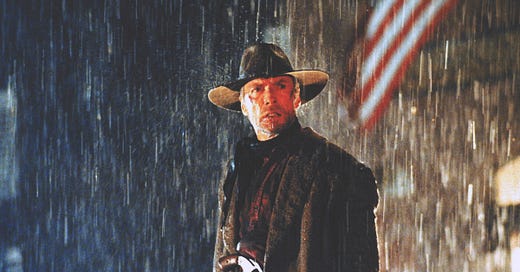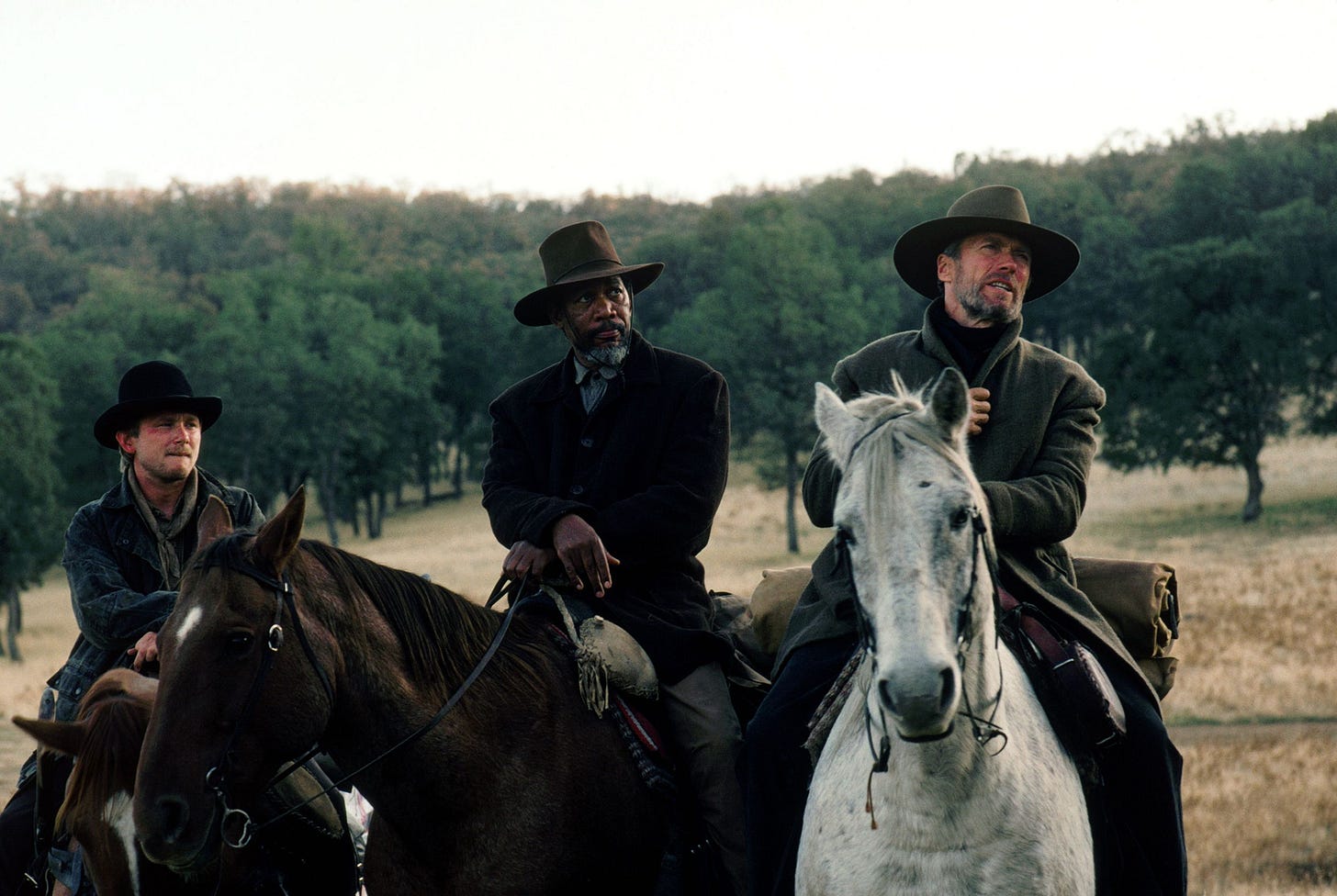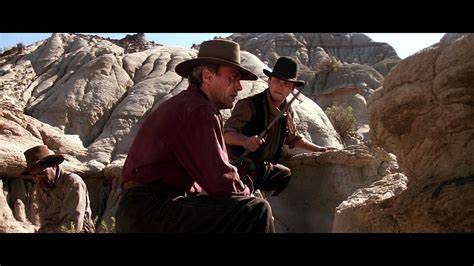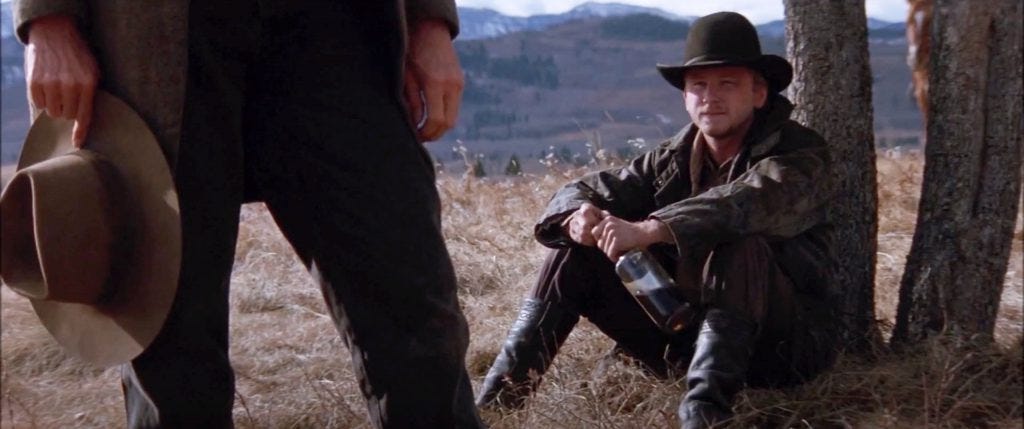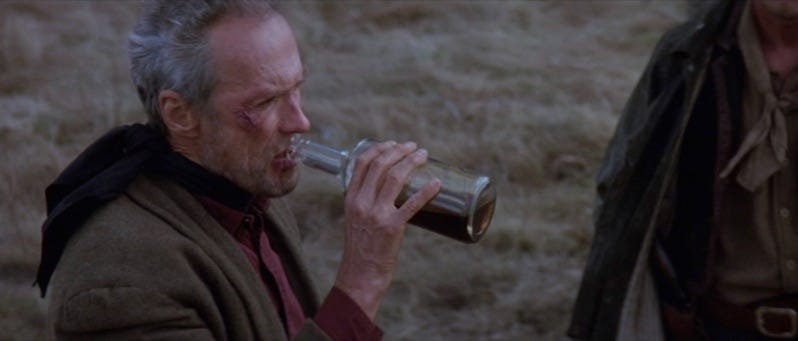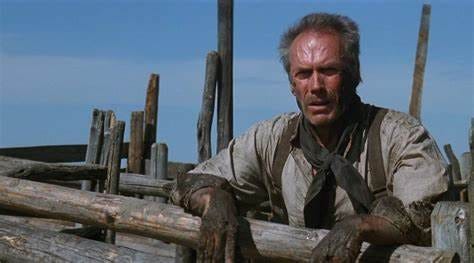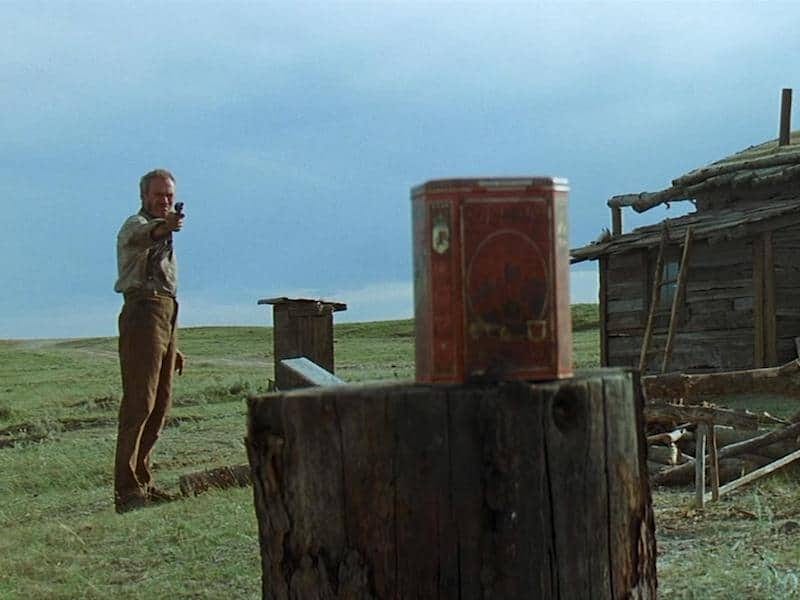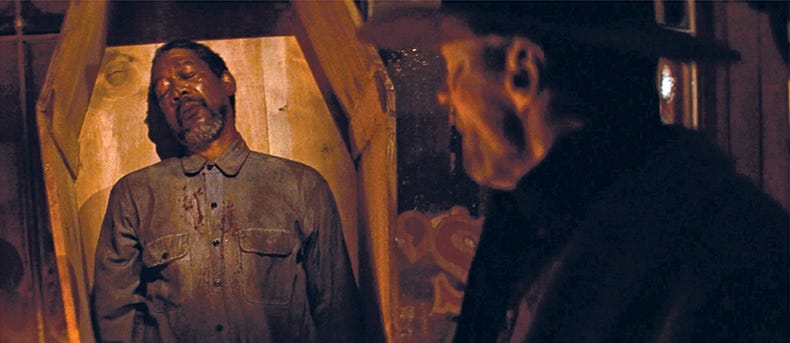Introduction to Unforgiven
In the “old west” the good guys were good, the bad guys were killed without a care, and gun fights were glorious. The “transitional west” turned the genre on its side. The good guys were flawed. The bad guys were principled. Gun fights were bloody and brutal. Unforgiven turns the genre completely around; it is an upside down western.
How does Unforgiven do that? In three ways::
It illustrates how the western myth was created, and by doing so dispels it
It reflects on what it means to take a life, and by doing so removes the glory
It portrays petty characters, and by doing so shows us there are no more heroes
To illustrate that last point we need to look no further than the spark that sets off the entire plot of the movie: a prostitute giggles at the diminutive size of a cowboy’s penis.
Opening Sequence
Unforgiven opens with a prostitute’s legs in the air. It is Davey Bunting and “Strawberry” Alice (Rob Campbell, Frances Fisher) together on a stormy night. They hear a commotion and rush into the next room. There, Davey’s friend and fellow cowboy “Quick” Mike is attacking Delilah Fitzgerald (David Mucci, Anna Thomson). Mike orders Bunting to hold her while he cuts her face with a knife. Apparently, Fitzgerald laughed at Mike’s tiny penis.
Somehow the cowboys are subdued and tied to a post. Sheriff “Little” Bill Daggett (Gene Hackman) orders the cowboys to pay Fitzgerald’s employer, Skinny DuBois (Anthony James), for his loss of revenue. Outraged by this miscarriage of justice, the prostitutes put up a $1,000 bounty - later called “whore’s gold” - for the murder of both cowboys.
The Telephone Game
The telephone game is played by school children. A message will be whispered into the first child’s ear. He will whisper it into the next ear, and so on until the last child reports the message. Inevitably the reported message will be different - sometimes much different - than the original.
The “Schofield Kid” recruits the more experienced Will Munny to help him collect the “whore’s gold.” Munny asks why the cowboys deserve to die. The “Kid” explains they cut up Delilah’s face, gouged out her eyes, cut off her ears and mutilated her breasts. But we have just seen the assault and know the damage was limited to her face. Brutal, to be sure, but not nearly as severe as the “Kid” describes. He probably isn’t lying, but rather is involuntarily playing a game of telephone: with each telling of Fitzgerald’s assault it becomes distorted until the story no longer resembles the truth. It happens again when Munny tells the story to Ned Logan and adds that Delilah’s fingers had been dismembered.
This telephone game is a small example of how a fact might spin into a legend. The idea will be further developed by the characters W. W. Beauchamp and “English” Bob.
W. W. Beauchamp and The “Duck of Death”
W. W. Beauchamp is played by Saul Rubinek. He is a dime novelist, the kind who “fictionalized real people such as ‘Buffalo Bill’ Cody, Kit Carson, ‘Billy the Kid’ and Jesse James, and exaggerated their exploits to legendary proportions” as I have discussed in an earlier essay.
Beauchamp is presently shadowing “English” Bob (Richard Harris). This immigrant from jolly old England is hired by the railroad to kill Chinese workers. The pair came to Big Whiskey, Wyoming in search of the aforementioned $1,000 bounty. Bob is just the cold blooded killer to collect. They don’t get far, however, as sheriff Daggett arrests both men, and beats Bob within an inch of his life. The sheriff is determined not to have any blood shed for this bounty.
At the jail, Daggett is reading Beauchamp’s latest book on “English” Bob, The Duke of Death. Only Daggett misreads the title as The Duck of Death. That’s quite the demotion - from a duke to a duck!
In The Duke of Death, “English” Bob defends a woman’s honor, demanding an apology from the rude “Two Gun” Corky Corcoran. Instead, “Two Gun” Corcoran draws on Bob with both his pistols, but Bob is faster and kills the man. Beauchamp admits to taking some artistic license with the story, but maintains it is factually accurate as reported by eyewitnesses.
But that’s not what happened. “Little” Bill was there in the Blue Bottle saloon, and he sets the record straight. First, “Two Gun” didn’t carry two guns. He was named that for the large size of his penis. Second, the only insult Corcoran committed was sleeping with a French woman that Bob was sweet on.
“Little” Bill’s version goes like this:
“Before he [Corcoran] knows what's happening, Bob here takes a shot at him! And he misses, 'cause he's so damn drunk. Now that bullet whizzing by panicked old Corky, and he did the wrong thing. He went for his gun in such a hurry that he shot his own damn toe off. Meantime Bob here, he's aiming real good, and he squeezes off another, but he misses, because he's still so damn drunk, and he hits this thousand-dollar mirror up over the bar. And now, the Duck of Death is as good as dead. Because Corky does it right. He aims real careful, no hurry…”
“And?” asks the captivated Beauchamp.
Daggett continues: “BAM! That Walker Colt blew up in his hand, which was a failing common to that model. You see, if Corky had had two guns instead of just a big dick, he would have been there right to the end to defend himself…[Bob] just walked over there real slow - 'cause he was drunk - and shot him right through the liver.”
The disparity between reality and fiction is shocking. It is hard to imagine this was caused by the telephone game effect. Daggett believes Bob was the primary source for The Duke of Death, and since Beauchamp doesn’t deny it we can assume Daggett is right.
Regardless where this story came from, the point is clear: the west was not so romantic as the dime novelists and, indeed, early filmmakers would have us believe. Rather, it was characterized by drunk men, penis jokes and murder.
The Price of Taking a Life
William Munny is played by the indefatigable and seemingly immortal Clint Eastwood. He is a widower raising two kids on a pig farm. Before his marriage he was a drunk, a murderer and an outlaw. “I ain't like that no more,” he later says. “I ain't the same, Ned. Claudia [his wife], she straightened me up, cleared me of drinkin' whiskey and all.”
The “Schofield Kid” is played by Jaimz Woolvett. He is young, practically blind and full of false bravado. He brags that he has killed five men including a Mexican that tried to stab him. He’d have killed more but for his youth.
Ned Logan is played by Morgan Freeman. Most westerns had virtually all white casts with certain exceptions, namely natives as background extras. In truth, the west was a diverse place because many people immigrated there in search of a new life and opportunity. “English” Bob is one such example. The American west was also home to many freed slaves who made their living as cowboys.
An aspiring bounty hunter, the “Kid” turns to Munny for help getting the “whore’s gold.” Munny initially refuses but realizes his failing pig farm will not support his children. “Just 'cause we're goin' on this killing, that don't mean I'm gonna go back to bein' the way I was. I just need the money, get a new start for them youngsters.” Munny recruits his friend and former partner, Logan, and the three search for the cowboys.
Davey Bunting is out with other cowboys when Logan, the “Kid” and Munny ambush him. Logan’s first shot misses the cowboy but hits the horse. The horse collapses on top of Bunting, breaking his leg. Crawling for cover, Bunting cries for help.
Hearing those cries causes Logan to lose his nerve. Although Logan has murdered before, he cannot bring himself to do it again. He’s a changed man. He hands the rifle over to Munny who finishes the job. But Munny is a bad shot, and hits Bunting in the gut. Slowly and agonizingly he bleeds out.
“I’m dyin’ boys! Jesus, I'm so thirsty,” cries Bunting.
Munny replies, “Give him a drink of water, goddamn it. Will you give him a drink of water for Christ's sake? We ain't gonna shoot.”
Logan and the others wait for Bunting to die, contemplating their actions and not looking too proud. The incident prompts Logan to return home without the gold. Munny and the “Schofield Kid” decide to finish the job.
“Quick” Mike is laying low at a ranch with a small posse to protect him. He foolishly leaves their protection to evacuate his bowels at the outhouse. The “Kid” shoots Mike while he is unarmed, pants down, sitting on the toilet.
Later, Munny and the “Kid” wait on the outskirts of town for the delivery of their gold. The “Kid” is nearly in tears and drinking liquor. He confesses that “Quick” Mike was his first murder. That Mexican who nearly stabbed him? Just busted his leg with a shovel.
“Jesus Christ!” says the “Kid”, “It don’t seem real. Guy ain’t gonna never breathe again, ever. Now he’s dead and the other one too, all on account of pullin’ a trigger.”
“It’s a hell of a thing,” replies Munny, “Killin’ a man. You take away all he’s got and all he’s ever gonna have.”
“Yeah. Well, I guess they had it comin’.”
“We all have it comin’, kid.”
The “Kid” gives Munny his gun and offers his share of the gold. He says he isn’t like Munny and swears he’ll never kill again.
Alcoholism
The use of alcohol in Unforgiven is significant. The reader may recall that Daggett states no less than three times that “English” Bob was drunk when he murdered Corky Corcoran. We have also just seen how the “Schofield Kid” took to the bottle to numb his regret for murdering “Quick” Mike. He swears to never kill again, but his continuing use of the bottle does not bode well.
Munny has been sober for many years. He tells stories of killing people while under the influence of alcohol.
Munny recalls, “Ned, you remember that drover I shot through the mouth and his teeth came out the back of his head? I think about him now and again. He didn't do anything to deserve to get shot, at least nothin' I could remember when I sobered up.”
The prostitute who delivers the gold tells Munny that Daggett had captured, tortured and killed Logan. Munny finally gives in to the drink. As the prostitute continues in graphic detail, Munny starts sipping the bottle of brown liquor. He has the gold; the job is done. He could take it back to his kids. But the incensed Munny chooses to take revenge on “Little” Bill.
Alcohol and murder go together. Although criminal justice and psychology are beyond the scope of this essay, a professional in either field will tell you that alcohol plays a major role in homicides today. It plays a major role in Unforgiven’s bloody conclusion, as well.
No More Heroes
Our first glimpse of the notorious killer, Will Munny, is of him falling into the mud. He is chasing some pigs and not having much luck. The “Schofield Kid” remarks, “You don’t look no meaner-than-hell, cold-blooded, damn killer.”
And that’s the point. Munny - or anybody else for that matter - is not the stalwart hero so prevalent in western lore. In fact, in contrast to the incredible marksmanship and graceful horsemanship of past heroes, Munny is clumsy.
Before traveling to Big Whiskey, Munny practices shooting a handgun. It has been years since he last used it. He misses his target every time. It’s only with a double barreled shotgun that he is finally able to hit it. And we have seen how he and Logan could barely hit Bunting with a Spencer rifle. He also repeatedly struggles to mount his horse. In one instance, this nearly gets him and the “Kid” killed.
“Little” Bill Daggett is the sheriff, but his version of law and order is merciless and cruel. He beats “English” Bob nearly to death. He gives Will Munny the same treatment when they first meet in Greely’s Saloon. While whipping Logan, Daggett says, “Now Ned, them whores are going to tell different lies than you. And when their lies ain't the same as your lies... Well, I ain't gonna hurt no woman. But I'm gonna hurt you. And not gentle like before... but bad.”
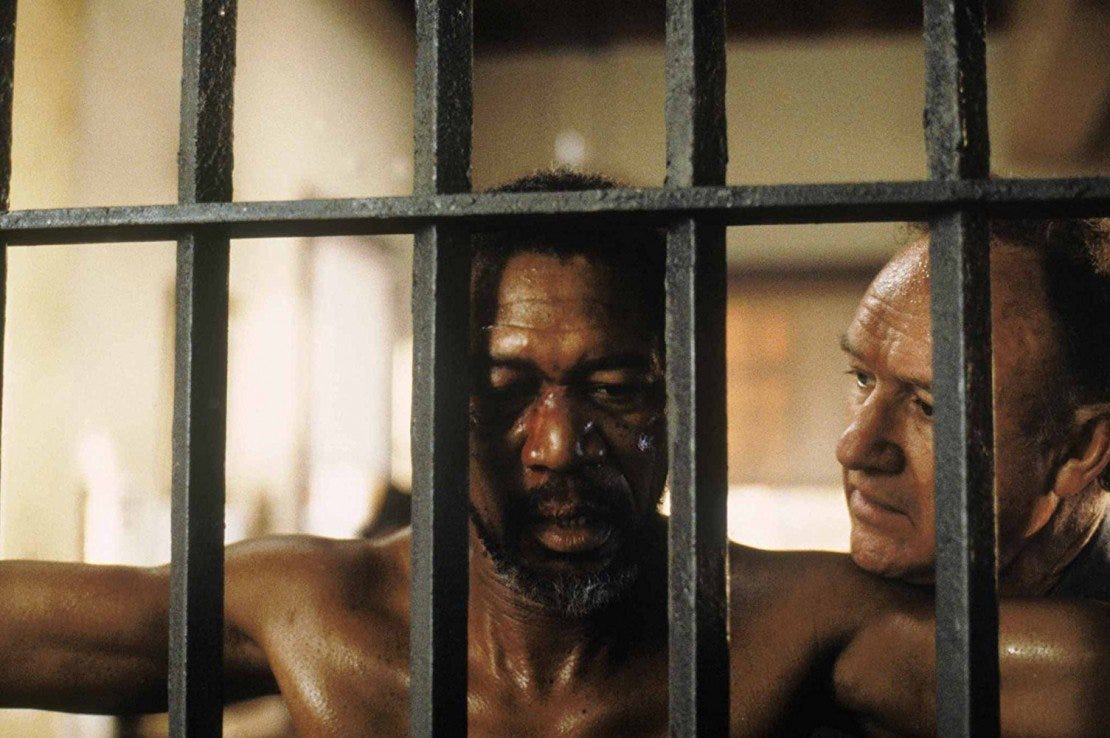
Logan has a murderous past and repeatedly cheats on his wife. The “Kid” is cowardly, foolhardy and arrogant. Dubois only cares for his profits. He beats the women, calls them liars and decorates his saloon with Logan’s corpse. Beauchamp glorifies common criminals. “English” Bob is a murderer and a pathetic one at that.
“Strawberry” Alice feels justified in placing a bounty on the cowboys who mutilated Fitzgerald. We can sympathize with her to an extent. But her thirst for blood encourages the violence. First, she wants Daggett to use a punishment more severe than a whipping. When Daggett settles on a fine, she begs for the whipping. To this Daggett replies, haven’t you seen enough blood for one night? Evidently not.
Alice pushes the others into placing the bounty. Even the victim, Fitzgerald, would rather just move on. Had Alice felt the same way, all the violence that followed would have been avoided.
Davey Bunting and Delilah Fitzgerald are the closest we get to a heroic or innocent character. The only blemish on Fitzgerald’s character is that she is a prostitute - a fact that today would go by unnoticed. But we will not call her a hero because she never stands up to Alice. Had this mousey, shy prostitute used her voice to say, “NO!” the bounty may never have been placed.
Bunting held Fitzgerald while Mike slashed her, but we get the sense he felt compelled to do so. Bunting is young and scared whereas Mike is older and clearly in charge. This does not exonerate Bunting for his role, but it mitigates his guilt. Bunting tries to make peace with Fitzgerald by offering her a fine horse. It’s a small gesture, but at least it’s something and shows Bunting to be basically a decent man. This act of kindness could have ended the story, but for “Strawberry” Alice who rallies the girls and pelts Bunting with dirt, rocks or manure.
Closing Sequence
Will Munny walks into Greely's Saloon where Daggett and his posse are planning their next move and likely having drinks. Slowly the crowd grows aware of him. “Who’s the fella that owns this shithole?” he asks. After some hesitation, Skinny Dubios steps forward, admitting he owns the saloon. Munny shoots him.
“Well, sir, you are a cowardly son of a bitch! You just shot an unarmed man!” says Daggett.
“Well, he should have armed himself if he's gonna decorate his saloon with my friend,” replies Munny.
Daggett tries to shift the moral responsibility away from himself - his cruelty and so forth - and onto Munny by pointing out how Munny, years earlier, killed women and children. Munny accepts his guilt.
“That's right. I've killed women and children. I've killed just about everything that walked or crawled at one time or another, and I'm here to kill you, Little Bill, for what you did to Ned.”
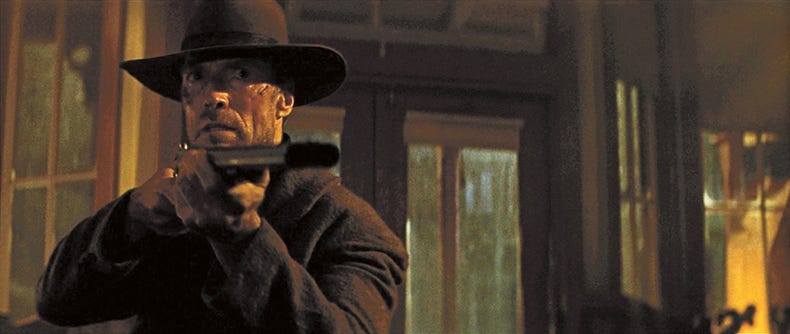
Munny’s first shot misfires. “Kill the son of a bitch!” Daggett yells. A shootout ensues. Everyone is killed except Munny and the unarmed Beauchamp. Munny immediately pours himself a drink at the bar.
It’s an incredible show of marksmanship especially for someone who couldn’t even hit a tin can. Or is it? Daggett explained the science of a shootout earlier in the film: “Look son, being a good shot, being quick with a pistol, that don't do no harm, but it don't mean much next to being cool-headed. A man who will keep his head and not get rattled under fire, like as not, he'll kill ya.”
Munny himself attributes his survival to luck: “I’ve always been lucky when it comes to killin’ folks.”
Munny leaves the saloon with threats on anyone who might take a shot at him or cut a prostitute: “All right now, I'm comin' out. Any man I see out there, I'm gonna shoot him. Any sumbitch takes a shot at me, I'm not only gonna kill him, but I'm gonna kill his wife. All his friends. Burn his damn house down.”
Conclusions for Unforgiven
Unforgiven is a masterpiece. It holds up a mirror to the western genre, and the reflection is not so nice. Unforgiven has morally bankrupt characters seeking petty revenge or self-interests. The truth is spun into lies by self-promoters and ignorant writers. The killing is not heroic. Rather, it’s cruel and often alcohol fueled. Those who do kill carry the guilt of it for the rest of their lives.
There is much more to be said about this movie - and all the movies included in this study. Perhaps I will return to them someday. But I hope to have shown how the American western evolved from a morally black-and-white vision of good guys defeating bad guys, to morally ambiguous characters, to an inversion of classical western tropes.
